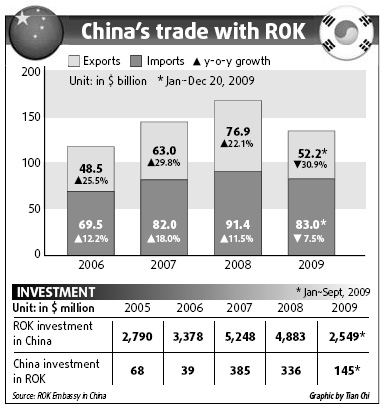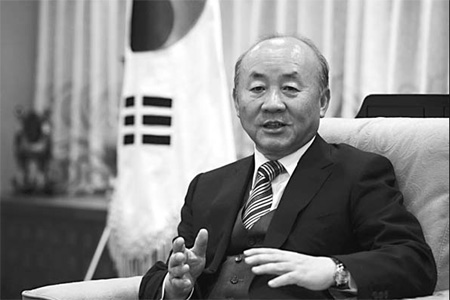China, ROK must 'work closely' for E. Asian bloc
|
The Republic of Korea's ambassador to China, Yu Woo-ik, says trade between China and his country will soon recover from the downturn. Guan Xin |
China and the Republic of Korea (ROK) should play a bigger role to promote East Asian integration, the top ROK envoy to China said yesterday.
"At the moment, we need to discuss the form, the structure and the members of the East Asian bloc," said Yu Woo-ik, the recently appointed ROK ambassador to China.
"The proposed body aims to handle problems of common concern and provide a mechanism of cooperation," Yu told China Daily before he presented his credentials to President Hu Jintao.
Yu, in his capacity as a professor earlier, floated the idea of an East Asian bloc more than 10 years ago. Many had said at that time that his initiative would remain just a dream.
However, "nowadays, more and more have realized that integration for countries with geographic proximity and complementarities are good to all, regardless of difference in cultures," he said.
The idea of forming an East Asian bloc has gained wide currency of late, with Japanese Prime Minister Yukio Hatoyama adopting the idea as his cornerstone policy.
China's free-trade agreement with the Association of Southeast Asian Nations, which came into force on Jan 1, has given a fillip to the idea.
Experts have suggested that the East Asian bloc should comprise China, Japan and the ROK, three of the top four economies in Asia.
Yu, however, said it was not easy to form an association on the lines of the European Union so soon, and that China and the ROK should work closely to facilitate regional integration.
In fact, some East Asian nations have started beefing up cooperation on currencies amid the financial crisis, Yu said.
The East Asian trio and the 10-member ASEAN last year increased the corpus of a regional foreign exchange fund from $84 billion to $120 billion.
Undersea connection
The Chinese and ROK governments have designated institutions to study the feasibility of a nearly 400 km undersea rail link between the two nations, Yu said.
"Growing people-to-people exchange, goods flows and economic cooperation call for the improvement of the transportation network," Yu said.
"Based on their studies, and after widely consulting all the relevant bodies in both nations, China and the ROK can decide whether the project should go ahead," Yu said.
Researchers proposed the undersea connection in late 2007, borrowing the idea from the successful Channel Tunnel that connects the UK to the European Continent.
The Institute for Comprehensive Transportation, under the National Development Reform Commission of China, proposed to extend the link from a ROK city to Weihai in East China's Shandong province, home to many investors from the ROK.
Trade and investment
Trade between China and the ROK this year could return to the level seen in 2008, since both nations have started recovering from the financial crisis, the ambassador said.
Bilateral trade plunged by nearly 20 percent last year to $135.2 billion, but recovered strongly in the second half.
"The financial crisis is to blame (for the dip in trade)," he said.
China's massive stimulus package - which also encouraged the country's 720 million farmers to buy cars and home appliances - boosted demand for some ROK goods, he said.
For example, the ROK's exports of liquid crystal displays and auto parts jumped by 81.5 percent and 33 percent, respectively.
Trade is expected to get back on track this year as China's economy grows by 8 to 9 percent and the ROK economy gets out of the downturn, Yu said.
China has surpassed Germany as the world's largest exporter, even as the ROK has become the 9th biggest.
Due to the financial crisis, fewer companies invested in each other's markets, Yu said.
The ambassador said he was glad to witness more hi-tech companies from the ROK - instead of labor-intensive firms - investing in China.
"It is very encouraging to see this change," he said.
Yu also said the ROK was rolling out the red carpet for Chinese firms.
"We hope established Chinese companies can step up their investments in the ROK," he said.

(China Daily 01/12/2010 page11)













